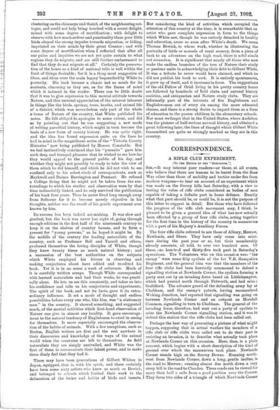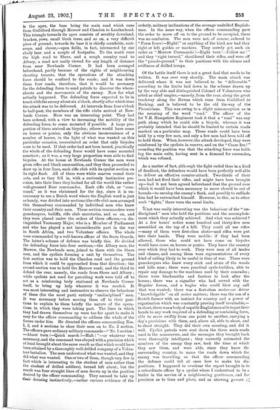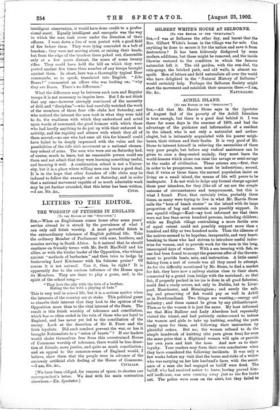CORRESPONDENCE.
A RIFLE CLUB EXPERIMENT.
[To THE EDITOR OP THE "SPECTATOR."] SIR,—It may interest your readers—or those, at all events, who believe that there are lessons to be learnt from the Boer War other than those of mobility and tactics under fire from modern weapons—to hear an account of an experiment which was made on the Surrey hills last Saturday, with a view to testing the value of rifle clubs considered as bodies of men capable of taking a definite part in home defence. Exactly what that part should be, or could be, it is not the purpose of this letter to suggest in detail. But those who have followed the progress of the rifle club movement may, I think, be pleased to be given a general idea of what has now actually been effected by a group of four rifle clubs, acting together for the first time in the history of the country in manceuvres with a part of his Majesty's Auxiliary Forces.
The four rifle clubs referred to are those of Albury, Merrow, Newlands, and Shere. They have only come into exist- ence during the past year or so, but their membership already amounts, all told, to over two hundred men. Of these, one hundred and thirty-five took part in Saturday's operations. The Volunteers who on this occasion were "the enemy " were some fifty cyclists of the 1st V.B. Hampshire Regiment, and the general idea was that the members of the four rifle clubs had been hurriedly summoned to defend a signalling station at Newlands Corner, the cyclists forming a party sent out by an invading force based on Littlehampton, which had pushed north through Petworth, and had seized Guildford. The advance guard of the defending army lay at Chobham, and the enemy's patrols, having reconnoitred Woking Junction, had reported that signalling was going on between Newlands Corner and an outpost on Horsfall Common, signalling in turn to Chobham. The general of the invading force, therefore, had sent out a party of cyclists to seize the Newlands Corner signalling station, and it was to defend this station that the rifle clubs had been called out.
Perhaps the best way of presenting a picture of -what might happen, supposing that in actual warfare the members of a rifle club or rifle clubs were called out to do their part in resisting an invasion, is to describe what actually took place at Newlands Corner on this occasion. Here, then, is a plain account, which begins with a short description of the kind of ground over which the manoeuvres took place. Newlands Corner stands high on the Surrey Downs. Running north- west from Newlands Corner, down a long, gentle incline, is the road to Merrow; running almost due north down a very steep hill is the road to Clandon. These roads can be viewed for more than half a mile from a good position near the Corner. They form two sides of a triangle of which Newlands Corner is the apex, the base being the main road which runs from Guildford through Merrow and Clandon to Leatherhead. This triangle towards its apex consists of scrubby downland, bracken, yews, small birch trees, and so on, a very difficult piece of ground; towards its base it is chiefly cornfields, root- crops, and clover,—open fields, in fact, intersected by one shady lane and a couple of footpaths. To the south runs the high road to Shere, and a rough country road to Albury, a road not easily viewed for any length of distance from near Newlands Corner. It had been arranged beforehand, partly because of the rights of neighbouring shooting tenants, that the operations of the attacking force should be confined to the roads ; and it was down these four roads, therefore, that it would be necessary for the defending force to send patrols to discover the where- abouts and the movements of the enemy. Now for what actually happened. The defending force expected to be in touch with the enemy about six o'clock, shortly after which time the attack was to be delivered. At intervals from four o'clock to half-past, the members of the rifle clubs arrived at New- lands Corner. Here was an interesting point. They had been ordered, with a view to increasing the mobility of the defending force, to come mounted if possible. A large pro- portion of them arrived on bicycles; others would have come on horses or ponies, only the obvious inconvenience of a number of horses, in the light of what was wanted on this particular occasion, necessitated an order that only bicycles were to be used. If that order had not been issued, practically the whole of the defending force would have come mounted somehow ; as it was, a very large proportion were able to find bicycles. At the house at Newlands Corner the men were given rifles and blank ammunition, and they then proceeded to draw up in four lines, each rifle club with its cyclist section on its right flank. All of them wore white scarves round their oats, and as they fell in, with a curiously instinctive pre- cision, into their lines they looked for all the world like rather well-groomed Boer commandos. Each rifle club, or "com- mand," as it was christened for the day, since it is un- necessary to use a Dutch word where the English word is just as handy, was divided into sections (the rifle club men arranged this themselves) commanded by individual men who knew their country and their men. These section commanders were gamekeepers, bailiffs, rifle club secretaries, and so on, and they were placed under the orders of three officers,---a dis- tinguished Yeomanry Major, who is a Member of Parliament and who has played a not inconsiderable part in the war in South Africa, and two Volunteer officers. The whole were commanded by a well-known officer of the Scots Guards. The latter's scheme of defence was briefly this. He divided the defending force into four sections,—the Albury men, the Merrow, the Newlands men, joined to them with the Shere men, and the cyclists forming a unit by themselves. The first section was to hold the Clandon road and the ground from which it could be approached from that direction ; the second section was to hold the Merrow road; and the third to defend the rear, namely, the roads from Shere and Albury ; while cyclists not used for patrolling work were told off to act as a reinforcing body stationed at Newlands Corner itself, to bring up help wherever it was needed. It was most interesting and instructive to observe the behaviour of these (for the most part) entirely " undisciplined " men. It was necessary before moving them off to their posi- tions to explain to them briefly the nature of the opera- tions in which they were taking part. The lines in which they had drawn themselves up were too far apart to make it easy for the officer commanding to address the whole of the forces under him. He directed the officers commanding Nos. 1, 2, and 4 sections to close their• men on to No. 2 section. The officers gave ordinary military commands—" No. 1 section ! —About turn !—Quick march I—Halt ! "—or whatever was necessary, and the command was obeyed with a precision which at least brought about the same result as that which would have been attained by a thoroughly well-drilled company of a Volun- teer battalion. The men understood what was wanted, and they did what was wanted. One or two of them, though very few (a fact which is interesting to the student of men rather than the student of drilled soldiers), turned left about; but the result was four straight lines of men drawn up in the position desired by the officer commanding. They seemed to take up their dressing instinctively,—rather curious evidence of the
orderly, military inclinations of the average undrilled English- man. In the same way, when the officer commanding gave the order to move off on to the ground to be occupied, there was no confusion. The men were not, of course, ordered to "Form fours !—Right !" or anything of the kind, nor had they right or left guides or markers. They merely got such an order as " Merrow Commando !—Right turn !—Follow me !" and they "right turned," shouldered their rifles, and were off the " parade-ground " to their positions with the silence and swiftness of drilled troops.
Of the battle itself there is not a great deal that needs to be written. It was over very shortly. The main attack was delivered where it was not believed to be " deliverable " according to the limits laid down in the scheme drawn up by the very able and distinguished Colonel of Volunteers who acted as chief umpire,—namely, from the rear, along the great trackway along the Downs which runs from Guildford to Dorking, and is believed to be the old tin-way of the Phoenicians. This was owing to a slight misconception as to the meaning of the word " road." The officer of the 1st V.B. Hampshire Regiment took it that a " road " was any path along which he could ride a bicycle, whereas it was probably intended that he should be limited to certain roads marked on a particular map. These roads could have been held by a very few men, and only a few men had been told off to hold them. When, however, the attack developed, they were reinforced by the cyclists in reserve, and on the " Cease fire ! " sounding the position was that the attacking force was hold- ing the main exits, having sent in a demand for surrender, which was refused.
As a matter of fact, although the fight ended thus in a kind of deadlock, the defenders would have been perfectly well able to deliver an effective counter-attack. Two-thirds of their men had not fired their rifles, and might have been brought up—had it not been agreed beforehand that the ground over• which it would have been necessary to move should be out of bounds—to envelop the enemy's flank, and possibly to enfilade him had he entrenched himself. However, to this, as to other such " fights," there were the usual limits.
What was really interesting was the behaviour of the " un- disciplined " men who held the positions and the accomplish- ment which they actually achieved. And what was achieved P At a few hours' notice some hundred and thirty-five men assembled on the top of a hill. They could all use rifles —many of them were first-class shots—and rifles were put into their hands. They were mobile : if they had been allowed, those who could not have come on bicycles would have come on horses or ponies. They knew the country over which they had to work. They were men of all trades and classes, and among them were representatives of every kind of calling likely to be useful in time of war. There were gamekeepers who knew every stick and stone of the woods and hills near ; there were practical cycle-builders, able to repair• any damage to the machines used by their comrades ; there were blacksmiths and farriers to look after the horses ; there was a signaller who had served with the Regular• forces, and a bugler who could blow any call that was wanted ; there was a first-class motor-car driver " knowledgable " on all motor matters; there was the son of a Scotch farmer with an instinct for country and a power of organisation which was constantly proving itself invaluable,— in short, there was a body of capable Englishmen able to put their hands to any work required of a defending or containing force, able to move swiftly from one point to another, carrying a day's provisions with them, and, above all, able to shoot, and. to shoot straight. They did their own scouting, and did it well. Cyclist patrols were sent down the three main roads used in the manoeuvres, and the messages they brought back were thoroughly intelligent ; they correctly estimated the numbers of the enemy they saw, took the time at which they saw them, and were able, since they knew thi. surrounding country, to name the roads down which the enemy was travelling, so that the officer commanding the defence could tell at once how to make his dis- positions. I happened to overhear the report brought in to a subordinate officer by a cyclist whom I understood to be a, butler in the service of a neighbouring gentleman, and for precision as to time and place, and as showing powers :It: intelligent observation, it would have done credit to a profes- sional scout. Equally intelligent and energetic was the way in which the men took cover under the direction of their officers. I went down a line of men posted with a good field of fire before them. They were lying concealed in a belt of bracken ; they were not moving about, or raising their heads, but from the edge of the bracken there poked out, discernible only at a few paces distant, the noses of some twenty rifles. They could have held the hill on which they were posted against five times their number of any troops brought against them. In short, here was a thoroughly typical Boer commando, so to speak, translated into English. "Like Boers ? " commented an officer who was looking on; " why they are Boers. There's no difference."
What the difference may be between such men and Regular troops it is not necessary to inquire here. But I do not think that any one—however strongly convinced of the necessity of drill and "discipline"—who had carefully watched the work of the members of these four rifle clubs last Saturday, and who noticed the interest the men took in what they were told to do, the readiness with which they understood and acted upon words of command, the good humour with which those who had hardly anything to do put up with their enforced in- activity, and the rapidity and silence with which they all of them moved,—no one who had seen all this for himself could have failed to be deeply impressed with the value and the possibilities of the rifle club movement as a national elemen- tary school of arms. The men who were out on Saturday had, of course, much to learn, but no reasonable person could see them and not admit that they were learning something useful, and learning it well. A continuation school is not a Univer- sity, but it is a place where willing men can learn a good deal. It is in the hope that other founders of rifle clubs may be induced to follow the example set on Saturday, and in order that a national movement capable of so much admirable work may be yet further extended, that this letter has been written.








































 Previous page
Previous page